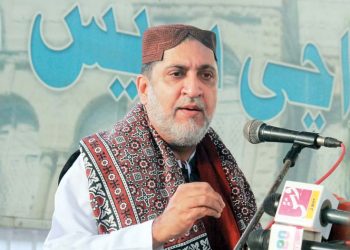A five-judge larger bench is hearing petitions filed against the formation of a judicial inquiry commission headed by senior puisne Judge Justice Qazi Faez Isa probing into the audio leaks allegedly involving current and former members of the superior judiciary and their family members.
The larger bench headed by Chief Juistice of Pakistan (CJP) Bandial and comprising Justice Ijazul Ahsan, Justice Munib Akhtar, Justice Syed Hassan Azhar Rizvi, and Justice Shahid Waheed hearing the pleas.
Hearing
At the outset of hearing, Attorney General for Pakistan (AGP) Mansoor Usman Awan raising objections asked the top judge to excuse himself, inviting a stronger reaction from the top judge.
At this, CJP Banidal remarked, “How can the government select judges of the Supreme Court [to serve] its own purpose?”
He added “Attorney general sahib, this is a matter concerning the judiciary’s independence. Enough is enough attorney general sahib, take a seat.”
CJP Bandial remarked the government cannot have judges included in benches “as per its wishes”.
He further said that because of the events of May 9, when violent protests broke out in the country following the arrest of the PTI chief, statements that were critical of the judiciary had stopped.
“Don’t interfere with our administrative powers,” Justice Bandial told the AGP. “We have complete respect for the government,” he said, adding that the judiciary was the protector of basic human rights.
Justice Bandial also observed that the government had legislated on regulating the CJP’s powers in haste. “If the government would have consulted us, we would have shown [you] a better path. You have also made bail and family cases a part of the legislation,” he said.
Centre forms commission
On May 20, the federal government constituted a three-member judicial commission to investigate the audio leak related to judges.
In order to investigate the audio leaks related to judges, the federal government has formed a three-member judicial commission.
The commission will comprise Justice Qazi Faez Isa, Balochistan High Court Chief Justice Naeem Akhtar Afghan, and Islamabad High Court Chief Justice Aamer Farooq.
A notification issued said the commission will be headed by Justice Isa. The notification also expressed concerns on behalf of the federal government.
The notification issued by the Cabinet Division says controversial audio leaks featuring a former chief justice of Pakistan are floating in the media. The conversation about judges raise serious concerns about their impartiality.
The audios of chief justices or judges of high courts have damaged public confidence, it further stated.
People have expressed concerns about the impartiality of judges of high courts, the document stated.
Petitions
Earlier on May 22, the Pakistan Tehreek-e-Insaf challenged in the Supreme Court the judicial commission formed to investigate the audio leaks.
A constitutional petition has been filed in the Supreme Court against the judicial commission.
The petition pleaded that the notification of the formation of the judicial commission should be declared null and void.
“No judge can be nominated for the commission without the permission of the chief Justice of Pakistan,” the petition stated.
The only forum for investigation or proceedings against a judge is the Supreme Judicial Council, it added.
On May 20, the federal government had constituted a three-member judicial commission to investigate the audio leaks related to judges and judiciary.
Meanwhile, the Supreme Court Bar Association (SCBA) President Abid Zuberi also filed a petition in the top court against the formation of the commission, arguing that the body was in violation of articles 9, 14, 18, 19, and 25 of the Constitution. It maintained that the Constitution did not allow tapping of citizens’ cell phones.
The petitioner inquired how the commission would issue an order without knowing the source of the audio recording.
It was also contended in the plea that the formation of the commission had interfered in the affairs of the Supreme Judicial Council (SJC).
The plea added that the recently surfaced audio leaks were tantamount to influencing the SC.
It further maintained that the audio recordings were being released on social media accounts in a systematic manner, and also maintained that the commission had ignored the quality of the audio recording during its proceedings.














































